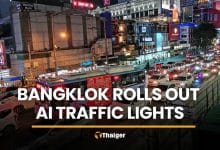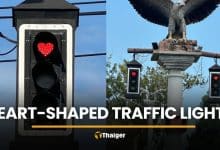Bangkok utilises AI-assisted cameras for traffic control, pedestrian safety

An intrusive blare rings out as a vehicle pulls up to the traffic lights at the Wong Sawang intersection. A Thai message reverberates in the air, courteously requesting, “Please don’t obstruct the zebra crossing. Thank you.” The alarm and its accompanying reminder will persist relentlessly until all drivers awaiting the signal’s shift from red to green have relocated their vehicles away from the pedestrian crossing, ensuring effective AI traffic control.
This is the raw embodiment of artificial intelligence (AI) being harnessed for a civic cause. City Hall has embarked on an AI traffic control initiative singularly focused on enhancing pedestrian safety across the capital. To this effect, cameras equipped with sensors have been installed at two major traffic junctions in Bangkok: Wong Sawang and Arun Amarin intersections.
Rapeepong Morakul, Director of the Traffic Technology System Division at the Bangkok Metropolitan Administration (BMA), provided insight into the system’s elaborate functionalities. Rapeepong said…
“The cameras will not only serve as a deterrent, but they can also capture a snapshot of both the act and the transgressor’s image.”
He further expressed his optimism about the newly integrated technology.
“The alarm and warning announcement is sufficiently audible to publicly embarrass offending motorists, thus optimistically aiding in the reduction of traffic violations.”
However, the images caught by the surveillance system will currently exist solely for admonition purposes. As Morakul elaborates, despite the capacity to identify lawbreakers, during this pilot phase, no legal proceedings will be initiated against culprits caught by the AI-assisted cameras. An exception to this leniency, however, lies in deliberate red-light violations, which if detected, will result in prosecutions.
The decision to incorporate these AI traffic control cameras derived from an ambitious plan to cease motorcycles and vehicles from congesting zebra crossings, ultimately ensuring effortless pedestrian movement in the city hubs. Despite established regulations against such disruptive actions, violations remain rampant.
This AI traffic control project was first proposed by the former Bangkok governor, Aswin Kwanmuang, and subsequently green-lighted when current city chief, Chadchart Sittipunt, signed a contract totalling a whopping sum of 106 million baht with Samart Comtech Co on August 31 the previous year, which granted permission to set up AI-assisted cameras at 20 key intersections in the city reported Bangkok Post.
Rapeepong further identifies additional 18 locations penned to receive this high-tech upgrade. These include Huai Khwang, Suan Ruen, Nida, Kan Kheha (Thi Din), Si Ayutthaya, Ratchawat, Ramkhamhaeng, Chao Khun Thahan, Ratchaprasong, Sala Daeng, Henri Dunant, Ratchayothin, Phang Muang, Sakae Ngam, Pharam 9, Wang Doem, Bukkhalo and Tha Din Daeng intersections, scheduled to be enveloped by surveillance.
Setting up the AI traffic control cameras at each location necessitates dedicated attention over two months, achieving an elevation sufficient to capture a comprehensive aerial view of the scene.
The system is touted as a precursor to a more developed version where all data sourced from the cameras will be utilized to control the corresponding traffic lights, thereby reconciling human negligence with AI preparedness.
Latest Thailand News
Follow The Thaiger on Google News:


























